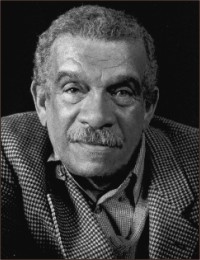| Author Profile
Derek Walcott
Compiled by Mahdin Mahboob
 Derek Alton Walcott, popularly known as Derek Walcott in short, is a West-Indian poet, playwright, writer and visual artist who has won the Nobel Prize for Literature in 1992. Born in 1930 Castries, St Lucia, he later moved to Trinidad in 1952. The experience of growing up on the isolated volcanic island, an ex-British colony, has had a strong influence on Walcott's life and work. Derek Alton Walcott, popularly known as Derek Walcott in short, is a West-Indian poet, playwright, writer and visual artist who has won the Nobel Prize for Literature in 1992. Born in 1930 Castries, St Lucia, he later moved to Trinidad in 1952. The experience of growing up on the isolated volcanic island, an ex-British colony, has had a strong influence on Walcott's life and work.
His work, which developed independently of the schools of magic realism emerging in both South America and Europe at around the time of his birth, is intensely related to the symbolism of myth and its relationship to culture. He is best known for his epic poem Omeros, a reworking of Homeric story and tradition into a journey around the Caribbean and beyond to the American West and London.
Walcott founded the Trinidad Theatre Workshop in 1959, which has produced his plays (and others) since that time, and remains active with its Board of Directors. He also founded Boston Playwrights' Theatre at Boston University in 1981 with the hope of creating a home for new plays in Boston, Massachusetts. Walcott continues to teach poetry and drama in the Creative Writing Department at Boston University and gives readings and lectures throughout the world. He divides his time between his home in the Caribbean and New York City.
Walcott has published more than twenty plays. The majority of these plays have been produced by the Trinidad Theatre Workshop, and have also been widely staged elsewhere. Many of them deal, either directly or indirectly, with the liminal status of the West Indies in the postcolonial period. Epistemological, ontological, economical, political, and social themes make regular appearances in Walcott's plays.
In his 1970 essay on art (and specifically theatre) in his native region, What the Twilight Says: An Overture (published in Dream on Monkey Mountain and Other Plays, Walcott bemoans the lasting effects of over 400 years of colonial rule. He reflects on the West Indies as colonized space, and the problems presented by a region with little in the way of truly indigenous forms, and with little national or nationalist identity. He states: “...we are all strangers here.... Our bodies think in one language and move in another...”. In this manner, Walcott shifts his poetic language between formal English and patois to highlight the linguistic dexterity of the Caribbean people. While recognizing the profound psychological and material wrongs of the colonial project, Walcott simultaneously celebrates the hybridization of Antillean cultures. His epic poem Omeros exposes the complex cultural strains that converge in his native St. Lucia, celebrating at once the European, Amerindian, and African heritage shared by the islanders.
Walcott probes the colonial dialectic in his two-hander Pantomime. In the play, Walcott revisions the story of Robinson Crusoe / Man Friday in an effort to destabilize the colonial power constructs. Reversing the roles of master / servant, Walcott temporarily lends to Trinidadian Jackson, a guest house factotum and calypso singer, the role of Crusoe, with Harry, a British ex-patriate and owner, the identity of “Thursday,” thus resetting Daniel Defoe's legend in pre-colonial days.
Walcott writes in English, the language of Trinidad, but he also makes full use of the local dialects, or what Barbadian writer Edward Kamau Brathwaite calls “nation language,” and portrays Jackson as code-switching throughout the play to reveal his culture's linguistic dexterity. Walcott's plays weave together a variety of forms; including those of the folktale, morality play, allegory, fable, ritual and myth; as well as using emblematic and mythological characters to address issues in non-realistic ways.
Sources : nobelprize.org & wikipedia.org
Copyright
(R) thedailystar.net 2007 |
